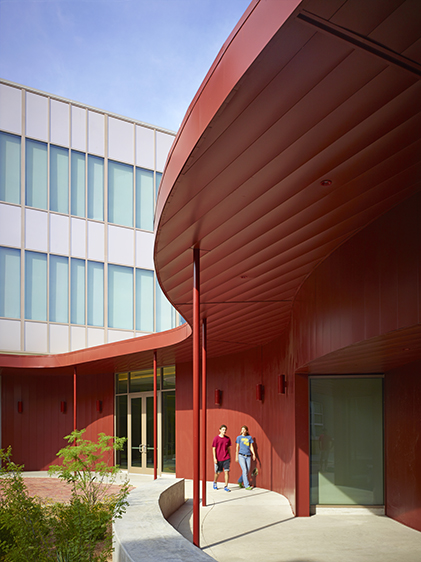Sep. 18, 2015
St. Edward’s University has been awarded a five-year grant of more than $1.6 million from the National Science Foundation through the Improving Undergraduate STEM Education (IUSE) Program to support freshmen students studying Science, Technology, Engineering and Mathematics (STEM) courses at St. Edward's University.
This award is the largest grant the university has ever received from the NSF, and it is one of only ten expected awards from the IUSE program for the entire country in the Institutional and Community Transformation: Design and Development IUSE program category.
The Living Learning Community/Active Learning (LLCAL) Project is designed to help first-year students by establishing science learning communities before classes start with a pre-college three-day bridge program. Since these students continue to live together and take many classes together throughout the academic year, they continue to support each other after classes begin.
Results from the current NSF STEM Talent Expansion Program (STEP) show that the community bonds persist even after the first year in residence, even though the

St. Edward’s University has been awarded a five-year grant of more than $1.6 million from the National Science Foundation through the Improving Undergraduate STEM Education (IUSE) Program to support freshmen students studying Science, Technology, Engineering and Mathematics (STEM) courses at St. Edward's University.
This award is the largest grant the university has ever received from the NSF, and it is one of only ten expected awards from the IUSE program for the entire country in the Institutional and Community Transformation: Design and Development IUSE program category.
The Living Learning Community/Active Learning (LLCAL) Project is designed to help first-year students by establishing science learning communities before classes start with a pre-college three-day bridge program. Since these students continue to live together and take many classes together throughout the academic year, they continue to support each other after classes begin.
Results from the current NSF STEM Talent Expansion Program (STEP) show that the community bonds persist even after the first year in residence, even though the community itself is only offered for first year students. St. Edward’s is exploring the possibility of a sophomore STEM LLC.
The LLCAL project aims to:
- Expand the supportive living learning community environment to all first-time STEM majors.
- Infuse active learning methods into entry and select advanced courses.
- Establish a faculty teaching community to refine active learning strategies.
- Prepare STEM majors for leadership positions in industry, academia and government.
- Increase student satisfaction, STEM persistence and graduation rates.
Richard Kopec, Associate Dean, Professor of Computer Science, and Principal Investigator on the grant program, says, “It’s important for STEM students to receive support early to help those who may not be totally prepared for college when they start with a combination of a special seminar course, direct tutoring in their residence hall, and close faculty and staff oversight.”
These interventions are designed to increase retention rates and ultimately increase the number of students receiving a STEM degree, a national priority identified by President Barack Obama.
“The STEM classes aren’t easy,” Kopec says. “If we’re there when students begin to struggle, we can help them persist, complete their degree and graduate.”
The LLCAL project is under the direction of St. Edward’s University faculty members Richard Kopec, Jason Callahan, Teresa Bilinski, Tricia Shepherd and Fidelma A. O’ Leary.
community itself is only offered for first year students. St. Edward’s is exploring the possibility of a sophomore STEM LLC.
The LLCAL project aims to:
- Expand the supportive living learning community environment to all first-time STEM majors.
- Infuse active learning methods into entry and select advanced courses.
- Establish a faculty teaching community to refine active learning strategies.
- Prepare STEM majors for leadership positions in industry, academia and government.
- Increase student satisfaction, STEM persistence and graduation rates.
Richard Kopec, Associate Dean, Professor of Computer Science, and Principal Investigator on the grant program, says, “It’s important for STEM students to receive support early to help those who may not be totally prepared for college when they start with a combination of a special seminar course, direct tutoring in their residence hall, and close faculty and staff oversight.”
These interventions are designed to increase retention rates and ultimately increase the number of students receiving a STEM degree, a national priority identified by President Barack Obama.
“The STEM classes aren’t easy,” Kopec says. “If we’re there when students begin to struggle, we can help them persist, complete their degree and graduate.”
The LLCAL project is under the direction of St. Edward’s University faculty members Richard Kopec, Jason Callahan, Teresa Bilinski, Tricia Shepherd and Fidelma A. O’ Leary.